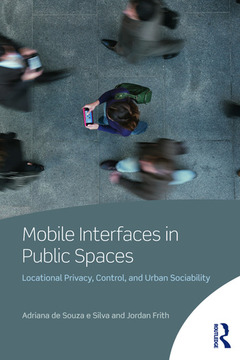Mobile Interfaces in Public Spaces Locational Privacy, Control, and Urban Sociability
Auteurs : de Souza e Silva Adriana, Frith Jordan

Mobile phones are no longer what they used to be. Not only can users connect to the Internet anywhere and anytime, they can also use their devices to map their precise geographic coordinates ? and access location-specific information like restaurant reviews, historical information, and locations of other people nearby. The proliferation of location-aware mobile technologies calls for a new understanding of how we define public spaces, how we deal with locational privacy, and how networks of power are developed today.
In Mobile Interfaces in Public Spaces, Adriana de Souza E. Silva and Jordan Frith examine these social and spatial changes by framing the development of location-aware technology within the context of other mobile and portable technologies such as the book, the Walkman, the iPod, and the mobile phone. These technologies work as interfaces to public spaces ? that is, as symbolic systems that not only filter information but also reshape communication relationships and the environment in which social interaction takes place. Yet rather than detaching people from their surroundings, the authors suggest that location-aware technologies may ultimately strengthen our connections to locations.
Introduction Part 1: Mobile Media History 1. Personalization 2. Privacy Part 2: Location-Awareness in Public Spaces 3. Mobile Phones 4. Location-Aware Media 5. Control and Personalization 6. Privacy and Surveillance 7. Conclusion
Adriana de Souza e Silva is Associate Professor in the Department of Communication at North Carolina State University. Her research focuses on how mobile and locative interfaces shape interactions with public spaces and create new forms of sociability. She is the co-editor of Digital Cityscapes: Merging Digital and Urban Playspaces, and co-author of Net-Locality: Why Location Matters in a Networked World,
Jordan Frith is a doctoral candidate in North Carolina State University's Communication, Rhetoric and Digital Media program. His main research interests are locative media and space, particularly how locative media may influence interactions in urban spaces. He has recently been published in the journals Mobilities and Communication, Culture, and Critique.
Date de parution : 04-2012
Ouvrage de 224 p.
15.2x22.9 cm
Disponible chez l'éditeur (délai d'approvisionnement : 14 jours).
Prix indicatif 56,31 €
Ajouter au panierDate de parution : 04-2012
Ouvrage de 224 p.
15.2x22.9 cm
Thèmes de Mobile Interfaces in Public Spaces :
Mots-clés :
aware; technologies; location-based; social; networks; technology; souza; service; advertising; phone; Location Aware Mobile Technologies; Location Aware Technologies; LBSNs; Location Aware Interfaces; Collateral Surveillance; Mobile Technologies; Mobile Phone Screen; Urban Sociability; Foursquare Users; Location Aware Devices; LBS; iPod Users; LBA; Mixed Reality Lab; Digital Information; Gps Tracking; Gps Trace; Share Location Information; Young Man; NTT DoCoMo; Locational Privacy; Gps Tracking Device; Audile Technique; Personal Mobile Technologies; Parole Officers
